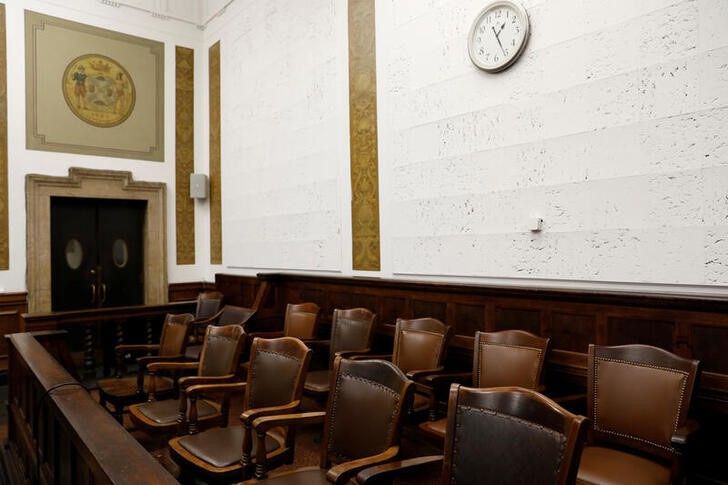TENNESSEE: State Judge Ignores Confederate Monuments Inside Their Own Courts
The Tennessee Court of Criminal Appeals held last week that it isn’t prejudicial for jurors to decide the fates of Black people from inside a government jury room effectively dedicated to the foundationally racist and slave-holding former Confederate States.
The August 16 opinion contradicts a ruling by a different panel of the same court that granted a retrial to a Black man, Tim Gilbert, in a separate case last December, based on jurors’ exposure to Confederate artifacts in the jury room.
The appellate court shirked its duty to confront patently obvious racism within the judicial system in its most recent ruling in Tennessee v. Barry Martin. Moreover, the court’s analysis could shut the door to other appeals of potentially biased convictions, unless the ruling is overturned by the Tennessee Supreme Court.
Martin plans to appeal the ruling. Evan Baddour, a Tennessee attorney who represents Martin and also represented Gilbert declined to comment further, citing the status of the case. A spokeswoman for the Tennessee Attorney General told me the office cannot comment on pending litigation.
Both cases concern the same jury room in the Giles County Circuit Court in Pulaski, Tennessee, which, coincidentally, sits across the street from the former law offices where the Ku Klux Klan was founded in the 1860s.
The courthouse jury room was officially dedicated in the 1930s to the local chapter of the United Daughters of the Confederacy (UDC), a private organization that has championed white supremacist views and erected Confederate monuments around the country.
Representatives of the UDC didn’t respond to requests for comment.
For decades, the jury room has featured a framed antique version of the third national flag of the Confederacy prominently positioned across from the doorway, according to the Martin opinion. There were also portraits of Confederate President Jefferson Davis and General John C. Brown. In 2005, the door was inscribed with “U.D.C. Room” and the UDC emblem – which also includes a Confederate flag.
The room was used during both Martin’s and Gilbert’s trials. A state commission decided the memorabilia could be moved to a museum after the Gilbert decision, the Tennessean reported in June. As of now, the room is still a Confederate-themed, UDC jury room, Giles County attorney Lucy Henson told me on Friday.
“As we sit here today, those items are still in there,” Henson said. Officials will move forward with the renovation once a new door has been installed, she said, adding that will happen “any day now.”
The state appeals court ordered a new trial in Gilbert’s case in December last year. The three-judge panel held that the memorabilia exposed jurors to prejudicial outside information, which violates the constitutional right to an impartial jury trial. The onus is on the government to prove jurors weren’t affected, not on Gilbert to show they were, the court found.
But in the latest ruling, a different panel reached the opposite conclusion from the Gilbert case on the same issue regarding the same jury room. The court in an opinion by Judge John W. Campbell ruled unanimously against a new trial for Martin, who was convicted of drug charges in 2020.
First, the judges dismissed the argument that they were required to follow their colleagues’ previous ruling. The Tennessee Supreme Court–which decided not to review the Gilbert ruling when the state appealed–had designated the opinion in that case “not for citation,” which means the ruling isn’t necessarily binding, Campbell wrote.
The court then went a step further.
“As to the memorabilia being inherently prejudicial, we question whether the average citizen would recognize the portraits,” the UDC logo, or the third national flag of the Confederacy, Campbell wrote.
The confederate battle flag is now a “controversial symbol,” in U.S. society, “[h]owever, the flag in this case is not the Confederate battle flag,” the court said.
In other words, racist imagery within the courthouse — which the court had found to be prejudicial in Gilbert’s case less than a year ago — is benign and non-discriminatory if some portion of the public wouldn’t recognize it, even if others do. And the court reached that conclusion even though the national flag at issue fully incorporates the admittedly racially oppressive Confederate battle flag.
Martin also argued that the memorabilia violated the Giles County court’s own duty of judicial impartiality, but the court dismissed that point on a technicality: Martin’s trial lawyer hadn’t raised the issue in the county court, so he couldn’t do so for the first time on appeal, Campbell wrote.
The court’s ruling evaded the most important questions in the case and missed an easy opportunity to strengthen judicial integrity and boost public confidence in the courts.
It’s fairly obvious that jurors might be negatively influenced toward Black defendants, and that Black jurors might be hesitant to participate fully in the process, if they deliberate in a Confederate-themed jury room, as the Tennessee Association of Criminal Defense Lawyers pointed out in a brief in Gilbert’s case.
Other courts have already taken steps to address similar issues, including by removing portraits of judicial officers like Confederate-sympathizers and slave-holders who no longer reflect prevailing values.
The North Carolina Supreme Court in 2020 removed a huge portrait of a former chief justice who was infamous for his violence toward slaves and Black people and had advocated for such treatment in his legal rulings, according to a state commission report on the issue.
Mississippi in 2020 changed its state flag, which included a Confederate emblem, after municipal judge Carlos Moore first began removing it from the courtroom in protest in 2017, as John Browning, a former Texas Court of Appeals justice and law partner at Spencer Fane, laid out in a 2022 law review article.
A county judge in Virginia removed a portrait of Robert E. Lee from the courtroom in 2020 at the defendant’s request, the Washington Post reported in September that year.
There is some empirical evidence that exposure to Confederate symbology can evoke prejudice in Americans. The defense lawyers association pointed in its brief to psychological research published in 2010 that showed that exposure to the Confederate flag “may actually provoke discrimination,” even among people who are low in prejudice.
The issues in the Gilbert and Martin cases will continue to arise for other Tennessee courthouses and in courthouses in other states, especially as Americans become more aware of the history of Confederate symbology in public and state-sanctioned spaces across the country.
The court in Martin’s case took a step backward. Hopefully the Tennessee Supreme Court recognizes that the symbols will continue to cause accusations of institutional racism and controversy in the judicial process, especially as long as they are sanctioned by the courts themselves.



